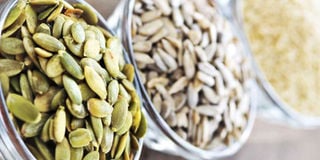Food and cancer

Sesame and sunflower seeds are rich in selenium, vitamin E, calcium and zinc, so eat a spoonful everyday to keep your antioxidant levels high. PHOTO | NATION
What you need to know:
- Vegetarians seem to have a lower incidence of cancer, so keep animal fats to a minimum, choosing the leanest cuts of meat and chicken. Eat fish like herring, mackerel, salmon and tuna instead of red meat.
- It’s all to do with a protein hormone in the blood called IGF or Insulin-like Growth Factor. IGFs play an important role in stimulating growth and metabolism. However, researchers at Harvard have shown that too much IGF can increase your risk of breast cancer three to fourfold.
According to the World Cancer Research Fund, the right diet can cut your risk of cancer by up to 40 per cent. So what foods should you avoid and which ones should you be eating? Use this list as a guide:
What to avoid
Alcohol: Reduce your intake to no more than one drink a day and ideally limit your intake to three or four drinks a week, preferably choosing red wine.
Animal fats: Vegetarians seem to have a lower incidence of cancer, so keep animal fats to a minimum, choosing the leanest cuts of meat and chicken. Eat fish like herring, mackerel, salmon and tuna instead of red meat.
Dairy produce: It’s all to do with a protein hormone in the blood called IGF or Insulin-like Growth Factor. IGFs play an important role in stimulating growth and metabolism. However, researchers at Harvard have shown that too much IGF can increase your risk of breast cancer three to fourfold. This link between milk consumption and cancer risk has also been confirmed by population studies.
Fried food: Minimise your intake of fried food. Boil, steam, poach or bake food instead. In addition, avoid or rarely eat burnt meat.
Pesticides and plastic: These act like strong oestrogens, so never heat food in a plastic container as the chemicals can leak into the food. Transfer food to glass or stainless steel prior to heating.
What to eat:
Fruit and vegetables: Eat at least five servings a day. Many cancer patients have low beta-carotene levels, so have a variety of colours, including something red/yellow/orange every day (carrots, sweet potato, tomatoes, watermelon) and something red/purple (berries, beetroot). All fruit and vegetables are also a good source of vitamin C, another potent antioxidant. Cruciferous vegetables (broccoli, Brussels sprouts, cabbage, cauliflower and sukuma wiki) also contain chemicals which protect against many cancers.
Garlic: A Chinese study found that provinces that used garlic liberally in their cooking had the lowest rate of stomach cancer. Garlic contains sulphur compounds that help deal with toxins and free radicals. Turmeric also contains anti-cancer agents.
Seeds: Sesame and sunflower seeds are rich in selenium, vitamin E, calcium and zinc, so eat a spoonful everyday to keep your antioxidant levels high. Sunflower seeds also contain pectin, which removes toxins and heavy metals from the body, while linseeds and sesame seeds contain lignans, which help to protect breast tissue.




